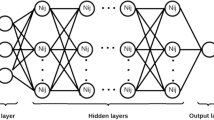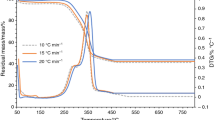Abstract
Vegetal fibers are prominent reinforcements for polymer composite materials, considering their properties and application possibilities. In particular, thermal degradation behavior is crucial for determining an application subjected to a temperature range. Methods to predict properties are a trend in materials science and have the main advantage of saving cost and time. For this reason, in the present study, an artificial neural network (ANN) approach was used to predict the thermal degradation curves. The heating rate of 10 °C·min− 1 was carried out to train the network with 12 hidden layers and optimal training dataset of 60. Other heating rates were simulated and showed an excellent agreement with the experimental data. The coefficient of determination was R2 > 0.99 for all sources of biomass, exhibiting appropriate predictive fit with error following the sequence: ramie (1.15 %) < kenaf (1.33 %) < curaua (1.83 %) < jute (1.97 %). In conclusion, ANNs can learn from their data and optimize processing, formulations, predict properties, and other input data combinations. The predictive curves present high reliability with the experimental fit allowing the prediction of the mass loss for different temperatures versus the heating rate set.
Graphic abstract







Similar content being viewed by others
Notes
European Bioenergy Day http://www.europeanbioenergyday.eu/bioenergy-facts/bioenergy-in-europe/. Access in: September 03rd, 2020
World Energy Council https://www.worldenergy.org/data/resources/resource/biomass. Access in: September 03rd, 2020
References
Ahmad AS, Hassan MY, Abdullah MP et al (2014) A review on applications of ANN and SVM for building electrical energy consumption forecasting. Renew Sustain Energy Rev 33:102–109. https://doi.org/10.1016/j.rser.2014.01.069
Altıntaş O, Aksoy M, Ünal E et al (2019) Artificial neural network approach for locomotive maintenance by monitoring dielectric properties of engine lubricant. Measurement 145:678–686. https://doi.org/10.1016/j.measurement.2019.05.087
Aquino EMF, Sarmento LPS, Oliveira W, Silva RV (2007) Moisture effect on degradation of jute/glass hybrid composites. J Reinf Plast Compos 26:219–233. https://doi.org/10.1177/0731684407070030
Bednaya TA, Konovalenko SP (2018) Development of a neural network model for predicting the physical and chemical properties of materials from the technological parameters of their formation. IOP Conf Ser Mater Sci Eng 447:5–9. https://doi.org/10.1088/1757-899X/447/1/012086
Biagiotti J, Puglia D, Kenny JM (2004) A review on natural fibre-based composites-part I. J Nat Fibers 1:37–68. https://doi.org/10.1300/J395v01n02_04
Burnham AK, Zhou X, Broadbelt LJ (2015) Critical review of the global chemical kinetics of cellulose thermal decomposition. Energy Fuels. https://doi.org/10.1021/acs.energyfuels.5b00350
Cabeza A, Sobrón F, Yedro FM, García-Serna J (2015) Autocatalytic kinetic model for thermogravimetric analysis and composition estimation of biomass and polymeric fractions. Fuel 148:212–225. https://doi.org/10.1016/j.fuel.2015.01.048
Castro JDS, da Silva EGP, Virgens CF (2020) Evaluation of models to predict the influence of chemical pretreatment on the peels of Nephelium lappaceum L based on pyrolysis kinetic parameters obtained using a combined Fraser-Suzuki function and Friedman’s isoconversional method. J Anal Appl Pyrolysis 149. https://doi.org/10.1016/j.jaap.2020.104827 https://doi.org/10.1016/j.jaap.2020.104827
Chen D, Gao A, Cen K et al (2018) Investigation of biomass torrefaction based on three major components: Hemicellulose, cellulose, and lignin. Energy Convers Manag 169:228–237. https://doi.org/10.1016/j.enconman.2018.05.063
Chen WH, Wang CW, Ong HC et al (2019) Torrefaction, pyrolysis and two-stage thermodegradation of hemicellulose, cellulose and lignin. Fuel 258:116168. https://doi.org/10.1016/j.fuel.2019.116168
Conesa JA, Caballero JA, Reyes-Labarta JA (2004) Artificial neural network for modelling thermal decompositions. J Anal Appl Pyrol 71:343–352. https://doi.org/10.1016/S0165-2370(03)00093-7
Debnath S, Reddy MM, Yi QS (2016) Influence of cutting fluid conditions and cutting parameters on surface roughness and tool wear in turning process using Taguchi method. Measurement 78:111–119. https://doi.org/10.1016/j.measurement.2015.09.011
Fayek HM, Lech M, Cavedon L (2017) Evaluating deep learning architectures for Speech Emotion Recognition. Neural Netw 92:60–68. https://doi.org/10.1016/j.neunet.2017.02.013
Giridharan R (2019) Preparation and property evaluation of glass/ramie fibers reinforced epoxy hybrid composites. Compos Part B Eng 167:342–345. https://doi.org/10.1016/j.compositesb.2018.12.049
Herzog S, Tetzlaff C, Wörgötter F (2020) Evolving artificial neural networks with feedback. Neural Netw 123:153–162. https://doi.org/10.1016/j.neunet.2019.12.004
Illing B, Gerstner W, Brea J (2019) Biologically plausible deep learning—But how far can we go with shallow networks? Neural Netw 118:90–101. https://doi.org/10.1016/j.neunet.2019.06.001
John MJ, Thomas S (2008) Biofibres and biocomposites. Carbohydr Polym 71:343–364. https://doi.org/10.1016/j.carbpol.2007.05.040
Lazzari LK, Zampieri VB, Neves RM et al (2019) A study on adsorption isotherm and kinetics of petroleum by cellulose cryogels. Cellulose 26:1231–1246. https://doi.org/10.1007/s10570-018-2111-x
Lopes FCR, Tannous K (2020) Coconut fiber pyrolysis decomposition kinetics applying single- and multi-step reaction models. Thermochim Acta 691:178714. https://doi.org/10.1016/j.tca.2020.178714
Moayedi H, Rezaei A (2019) An artificial neural network approach for under-reamed piles subjected to uplift forces in dry sand. Neural Comput Appl 31:327–336. https://doi.org/10.1007/s00521-017-2990-z
Mohan D, Pittman CU, Steele PH (2006) Pyrolysis of wood/biomass for bio-oil: a critical review. Energy Fuels 20:848–889. https://doi.org/10.1021/ef0502397
Monticeli FM, Almeida JHS, Neves RM et al (2020) On the 3D void formation of hybrid carbon/glass fiber composite laminates: A statistical approach. Compos Part A Appl Sci Manuf 137:106036. https://doi.org/10.1016/j.compositesa.2020.106036
Moukhina E (2012) Determination of kinetic mechanisms for reactions measured with thermoanalytical instruments. J Therm Anal Calorim 109:1203–1214. https://doi.org/10.1007/s10973-012-2406-3
Neves RM, Lopes KS, Zimmermann MVG et al (2019a) Characterization of polystyrene nanocomposites and expanded nanocomposites reinforced with cellulose nanofibers and nanocrystals. Cellulose 2:. https://doi.org/10.1007/s10570-019-02392-2
Neves RM, Lopes KS, Zimmermann MGV et al (2019) Cellulose nanowhiskers extracted from tempo-oxidized curaua fibers. J Nat Fibers 17:1355–1365. https://doi.org/10.1080/15440478.2019.1568346
Orfão J, Antunes F, Figuereido J (1999) Pyrolysis kinetics of lignocellulosic materials—three independent reactions model. Fuel 78(3):346–358. https://doi.org/10.1016/S0016-2361(98)00156-2
Ornaghi HL, Poletto M, Zattera AJ, Amico SC (2014) Correlation of the thermal stability and the decomposition kinetics of six different vegetal fibers. Cellulose 21:177–188. https://doi.org/10.1007/s10570-013-0094-1
Ornaghi Júnior HL, Ornaghi FG, Neves RM et al (2020) Mechanisms involved in thermal degradation of lignocellulosic fibers: a survey based on chemical composition. Cellulose 27:4949–4961. https://doi.org/10.1007/s10570-020-03132-7
Pang S (2019) Advances in thermochemical conversion of woody biomass to energy, fuels and chemicals. Biotechnol Adv 37:589–597. https://doi.org/10.1016/j.biotechadv.2018.11.004
Pathak U, Kumari S, Kumar A, Mandal T (2020) Process parametric optimization toward augmentation of silica yield using Taguchi technique and artificial neural network approach. Energy Ecol Environ 5:294–312. https://doi.org/10.1007/s40974-020-00152-8
Poletto M, Ornaghi Júnior HL, Zattera AJ (2014) Native cellulose: structure, characterization and thermal properties. Materials (Basel) 7:6105–6119. https://doi.org/10.3390/ma7096105
Proskurina S, Junginger M, Heinimö J et al (2019) Global biomass trade for energy— Part 2: Production and trade streams of wood pellets, liquid biofuels, charcoal, industrial roundwood and emerging energy biomass. Biofuels Bioprod Biorefining 13:371–387. https://doi.org/10.1002/bbb.1858
Sánchez-Jiménez PE, Pérez-Maqueda LA, Perejón A, Criado JM (2009) Combined kinetic analysis of thermal degradation of polymeric materials under any thermal pathway. Polym Degrad Stab 94:2079–2085. https://doi.org/10.1016/j.polymdegradstab.2009.07.006
Schmidhuber J (2015) Deep Learning in neural networks: an overview. Neural Netw 61:85–117. https://doi.org/10.1016/j.neunet.2014.09.003
Schmidt J, Marques MRG, Botti S, Marques MAL (2019) Recent advances and applications of machine learning in solid-state materials science. NPJ Comput Mater. https://doi.org/10.1038/s41524-019-0221-0
Sunphorka S, Chalermsinsuwan B, Piumsomboon P (2017) Artificial neural network model for the prediction of kinetic parameters of biomass pyrolysis from its constituents. Fuel 193:142–158. https://doi.org/10.1016/j.fuel.2016.12.046
Teixeira FP, Gomes O, da FM, Silva F de A (2019) Degradation mechanisms of curaua, hemp, and sisal fibers exposed to elevated temperatures. BioResources 14(1):1494–1511
Tiwari A, Raj B (2015) Reactions and mechanisms in thermal analysis of advanced materials
Uzuner S, Cekmecelioglu D (2016) Comparison of artificial neural networks (ANN) and adaptive neuro-fuzzy inference system (ANFIS) models in simulating polygalacturonase production. BioResources 11:8676–8685. https://doi.org/10.15376/biores.11.4.8676-8685
Vyazovkin S (2020) Kissinger method in kinetics of materials: things to beware and be aware of. Molecules. https://doi.org/10.3390/molecules25122813
Yang H, Yan R, Chen H et al (2006) In-depth investigation of biomass pyrolysis based on three major components: Hemicellulose, cellulose and lignin. Energy Fuels 20:388–393. https://doi.org/10.1021/ef0580117
Yao F, Wu Q, Lei Y et al (2008) Thermal decomposition kinetics of natural fibers: activation energy with dynamic thermogravimetric analysis. Polym Degrad Stab 93:90–98. https://doi.org/10.1016/j.polymdegradstab.2007.10.012
Yeo JY, Chin BLF, Tan JK, Loh YS (2019) Comparative studies on the pyrolysis of cellulose, hemicellulose, and lignin based on combined kinetics. J Energy Inst 92:27–37. https://doi.org/10.1016/j.joei.2017.12.003
Zanchet A, Demori R, de Sousa FDB et al (2019) Sugar cane as an alternative green activator to conventional vulcanization additives in natural rubber compounds: thermal degradation study. J Clean Prod 207:248–260. https://doi.org/10.1016/j.jclepro.2018.09.203
Zhang Z, Friedrich K, Velten K (2002a) Prediction on tribological properties of short fibre composites using artificial neural networks. Wear 252:668–675. https://doi.org/10.1016/0013-7952(66)90012-3
Zhang Z, Klein P, Friedrich K (2002) Dynamic mechanical properties of PTFE based short carbon fibre reinforced composites: experiment and artificial neural network prediction. Compos Sci Technol 62:1001–1009. https://doi.org/10.1016/S0266-3538(02)00036-2
Zhang Z, Friedrich K (2003) Artificial neural networks applied to polymer composites: a review. Compos Sci Technol 63:2029–2044. https://doi.org/10.1016/S0266-3538(03)00106-4
Zhao Z, Lou Y, Chen Y et al (2019) Prediction of interfacial interactions related with membrane fouling in a membrane bioreactor based on radial basis function artificial neural network (ANN). Bioresour Technol 282:262–268. https://doi.org/10.1016/j.biortech.2019.03.044
Acknowledgments
The authors thank CAPES, CNPq, and FAPESP for the financial support.
Author information
Authors and Affiliations
Contributions
All authors contributed to the study conception and design. Conceptualization: Francisco M. Monticeli, Roberta M. Neves, Heitor L. Ornaghi Jr. Methodology: Francisco M. Monticeli, Roberta M. Neves, Heitor L. Ornaghi Jr. Formal analysis and investigation: Francisco M. Monticeli and Heitor L. Ornaghi Jr. Writing original draft preparation and editing: Francisco M. Monticeli and Heitor L. Ornaghi Jr. Revision of the Manuscript: Roberta M. Neves.
Corresponding author
Additional information
Publisher’s note
Springer Nature remains neutral with regard to jurisdictional claims in published maps and institutional affiliations.
Rights and permissions
About this article
Cite this article
Monticeli, F.M., Neves, R.M. & Ornaghi Júnior, H.L. Using an artificial neural network (ANN) for prediction of thermal degradation from kinetics parameters of vegetable fibers. Cellulose 28, 1961–1971 (2021). https://doi.org/10.1007/s10570-021-03684-2
Received:
Accepted:
Published:
Issue Date:
DOI: https://doi.org/10.1007/s10570-021-03684-2




